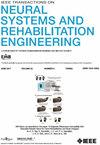巫师学徒:沉浸式VR中的严肃游戏系统作为脑瘫儿童可行的康复方法。
IF 5.2
2区 医学
Q2 ENGINEERING, BIOMEDICAL
IEEE Transactions on Neural Systems and Rehabilitation Engineering
Pub Date : 2025-08-04
DOI:10.1109/TNSRE.2025.3595420
引用次数: 0
摘要
虚拟现实为参与者提供了参与具有挑战性的康复练习的机会,以严肃游戏的形式提出。现代VR技术可以进一步增强可用性,允许参与者徒手与VR环境无缝交互,无需外部跟踪系统和复杂的设置。在儿童神经康复中,参与可以促进动机和对运动的关注,这是康复过程有效性的两个关键因素。在这项工作中,我们开发了一个由三个沉浸式VR严肃游戏组成的康复系统,针对脑瘫儿童的上肢和躯干进行运动锻炼。参与者扮演一个巫师学徒的角色,被召唤去施法、准备药剂和骑一只魔法鹰。这些游戏场景涉及与轨迹跟踪、前后旋拾取和躯干平衡相关的协调运动功能。本初步研究(12名CP儿童,24期),重点评估康复方法的可行性,然后通过整个治疗过程中记录的数据,对运动参数的适应和进展进行更深入的分析。研究表明,沉浸式VR游戏在康复过程中是一种可行的方法,在可接受性、保留性、坚持计划练习和长期使用中没有不良影响方面都有积极的结果。他们在改善运动功能方面也显示出有希望的结果,尽管研究中没有包括与对照组的直接比较。本文章由计算机程序翻译,如有差异,请以英文原文为准。
The Wizard Apprentice: A Serious Games System in Immersive VR as a Feasible Rehabilitation Approach in Children With Cerebral Palsy
Virtual reality offers the opportunity to engage the participant in challenging rehabilitation exercises, proposed in the shape of serious games. Modern VR technologies can further enhance usability, allowing the participant to seamlessly interact with VR environment with bare hands, without need of external tracking systems and complex setups. In children neurorheabilitation engagement can promote motivation and attention to the exercise, two key elements for effectiveness of the rehabilitation process. In this work we developed a rehabilitation system composed of three serious games in immersive VR, with motor exercises targeting the upper limb and trunk in children with Cerebral Palsy. The participant plays in the role of a wizard apprentice, called to cast spells, to prepare potions and to ride a magic eagle. These game scenarios involve coordinated motor functions related to trajectory tracking, pick-and-place with prono-supination, and trunk balance. The presented pilot study (12 CP children, 24 sessions), focuses on the feasibility assessment of the rehabilitation method, then, it allows a more in depth analysis on the adaptation and progress of the exercise parameters through data recorded during the whole treatment. The study shows that immersive VR games are a feasible approach in rehabilitation procedures, with positive results regarding acceptability, retention, adherence to the planned exercises and absence of adverse effects in the long-term use. They also show promising results in improvements of motor functions, although a direct comparison with a control group was not included in the study.
求助全文
通过发布文献求助,成功后即可免费获取论文全文。
去求助
来源期刊
CiteScore
8.60
自引率
8.20%
发文量
479
审稿时长
6-12 weeks
期刊介绍:
Rehabilitative and neural aspects of biomedical engineering, including functional electrical stimulation, acoustic dynamics, human performance measurement and analysis, nerve stimulation, electromyography, motor control and stimulation; and hardware and software applications for rehabilitation engineering and assistive devices.

 求助内容:
求助内容: 应助结果提醒方式:
应助结果提醒方式:


